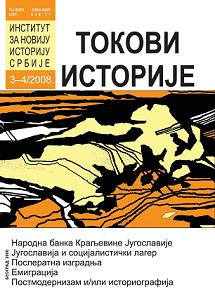ЈУГОСЛОВЕНСКИ УТИСЦИ О ОДЈЕКУ СТАЉИНОВЕ СМРТИ У БУГАРСКОЈ И РУМУНИЈИ
Yugoslav Impressions of the Echo of Stalin’s Death in Bulgaria and Romania
Author(s): Vladimir CvetkovićSubject(s): History
Published by: Institut za noviju istoriju Srbije
Keywords: Yugoslavia; Bulgaria; Romania; J. V. Stalin; East-European countries; Yugoslav-Bulgarian relations; Yugoslav-Romanian relations
Summary/Abstract: Although Bulgaria and Romania were Yugoslavia’s neighbors, judging by the state of their bilateral relations with it, several years before Stalin’s death they could have been on another continent. The reason was a sharp ideological, and then inter-state confl ict between the USSR and Yugoslavia which fl ared up in 1948 and which engulfed all „people’s democracies“ of the Soviet block. Yugoslavia’s relations with Bulgaria and Romania were completely spoiled, and in the case of Bulgaria they were additionally encumbered with the unfortunate legacy of the past. The situation on the borders verged on the state of war. Observing the echo of Stalin’s death in Bulgaria and Romania during the spring of 1953, Yugoslav diplomats on the spot noticed bigger or smaller signs of change in these two countries. That echo in leaderships of these countries, in their ruling parties, armies, diplomatic corps and citizenry served later on as basis for Yugoslav estimates of general trends and possibilities of eventual changes in Bulgaria and Romania, and concomitantly, the possibility for normalization of Yugoslavia’s relations these with neighboring countries. The impression the echo of Stalin’s death left on Yugoslav diplomats in Sofi a, Bucharest and Belgrade testify to their good knowledge of the essence of the then societies in Bulgaria and Romania. As an occasion to summarize impressions, Stalin’s death showed that all contradictions in the neighboring countries, which then became more accentuated, were well known in Yugoslavia. The events that followed showed that there was an „outside“ and a „real“ picture of relations toward the authorities and the ruling ideology in societies there. They also showed how dependent of the attitude and the will of the Soviet Union were the ruling elites, incarnated in the Bulgarian Communist Party and the Workers’ Party of Romania.
Journal: Tokovi istorije
- Issue Year: 2008
- Issue No: 3-4
- Page Range: 60-75
- Page Count: 16
- Language: Serbian

